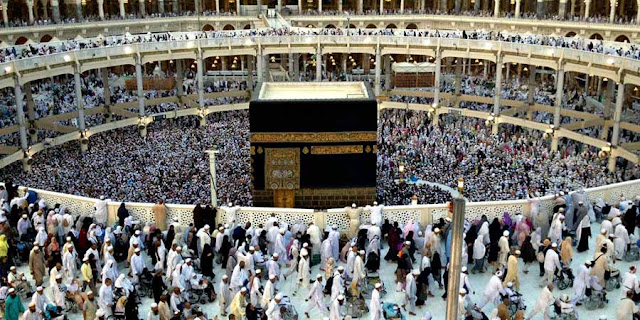Hajj and Inner Peace
When Allaah The Almighty bestows upon a believing slave the blessing of calling him to perform the obligation of Hajj, this slave who loves Allaah The Exalted feels an overwhelming happiness, combined with awe and humble submission. He is conscious of the great responsibility that he should assume and the trust that must be discharged. He prostrates in humble submission and loves to praise and thank Allaah The Almighty for His great favor upon him, asking Allaah The Almighty to accept his Hajj and to help him safeguard it.
Hajj is a great responsibility before Allaah The Almighty; it requires sincerity, truthfulness in words and deeds, purity of the soul and inner peace.
Preparation for the journey of Hajj requires special behavior. The believing slave determines to travel to perform the obligation of Hajj being peaceful, chaste and pure with no impurity in his heart, overwhelmed by love for Allaah The Almighty, hoping to attain His mercy and seeking His pleasure.
The sincere slave who loves Allaah The Almighty starts his preparation for the Hajj journey with a peaceful mind; he purifies himself and elevates his heart, spirit and self to the highest levels of inner peace. He starts taking himself to account for his deeds, and to recall the incidents of his life, to take his actions towards himself and others into consideration. If he had ever abused or wronged someone, or was a reason for hurting someone, he should immediately seek the pardon of Allaah The Almighty first, and then ask for forgiveness from the one whom he wronged or hurt.
Complete forgiveness and perfect repentance depends upon the issue of preserving the rights of slaves. Allaah The Exalted quotes Nooh may Allaah exalt his mention as saying to his people (what means): {Worship Allaah, fear Him and obey me. Allaah will forgive you of your sins.} [Quran 71:3-4]
Allaah The Almighty does not Say "forgive all your sins", rather, He Says: {Forgive you of your sins}. That is to say that the forgiveness of some sins will remain suspended till the rights of slaves are fulfilled. Such sins are not pardoned by Allaah The Almighty except after fulfilling the rights of His slaves, or if they pardon orwaive them.
What is injustice? Many people mistakenly believe that a person may do whatever he wishes, then perform the obligation of Hajj and return as he was on the day he was delivered by his mother: without sin or error.
How can one allow himself to wrong others and become the cause of hurting or abusing them in any form whatsoever? Then, merely after performing the obligation of Hajj, he returns and feels as if he has not committed any mistakes. Where is the right of the people he wronged?
The Noble Quran denounced injustice in the strongest terms and threatened wrongdoers with painful torture. Moreover, just as it threatened wrongdoers, it promised those wronged, with victory and support.
In addition, it calmed them as it prohibited the public mention of evil, except by the one who has been wronged. Allaah The Exalted granted the right of public mention of evil to those who have been wronged because He knows the extent of the anguish and troubled feelings within the wronged person.
A wrongdoer is someone whose heart is afflicted with the disease of pride. He is selfish, arrogant and domineering to an unhealthy extent. He does not see anyone other than himself and is concerned only with achieving his own interests, even if the price is to transgress on the interests and rights of others and to hurt their humanity, dignity and pride. He is someone who has forgotten Allaah The Almighty, so Allaah The Almighty made him forget himself.
There are three types of injustice:
* Injustice between man and Allaah The Almighty: it is injustice pertaining to the right of Allaah The Exalted. It is intended to mean disbelief, Shirk (polytheism) and hypocrisy with Allaah The Almighty. This type of injustice is considered great for Allaah The Exalted Says (what means): {Indeed, association [with Him] is great injustice.} [Quran 31:13]
This type of injustice is not forgiven by Allaah The Almighty, because Allaah The Almighty forgives all the sins of whoever He wishes, except the sin of associating anything with Him.
* Another type of injustice is between a man and himself: it is injustice towards the right of the human self, where the slave neglects and takes the obligations that Allaah The Almighty ordered him to fulfill lightly, such as being lazy when performing acts of worship. This is how man wrongs himself. Allaah The Exalted Says (what means): {among them is he who wrongs himself.}[Quran 35:32]
Allaah The Almighty forgives this kind of injustice to whom He wills.
* Injustice between a man and people: it constitutes injustice towards the rights of others, such as unjustly consuming the rights of others, wronging them with a false testimony or wrongfully using power and authority to abuse and humiliate people.
Article by: www.islamweb.net

No comments:
Post a Comment